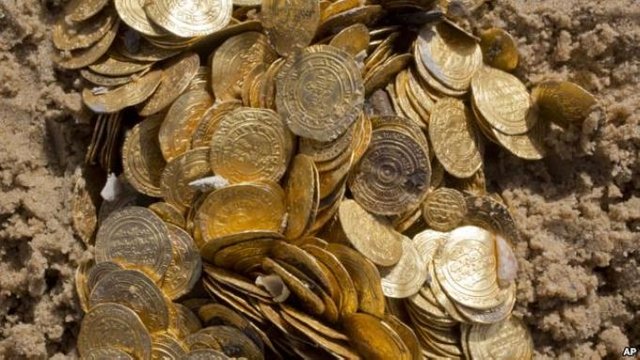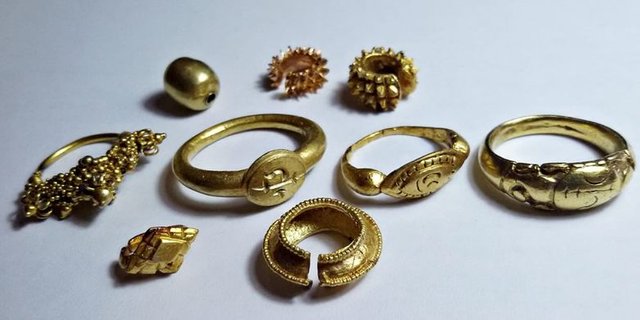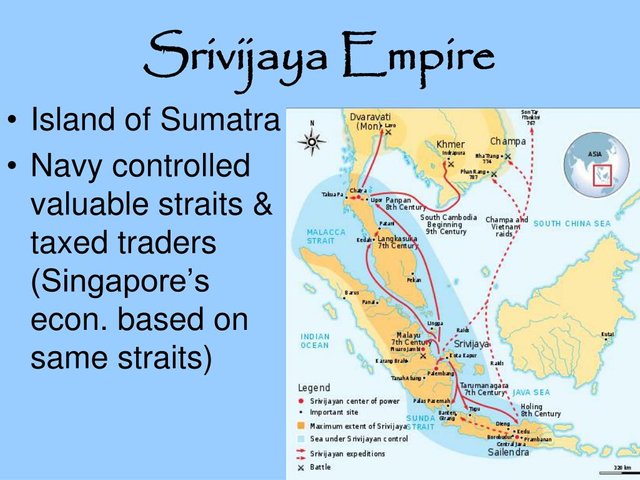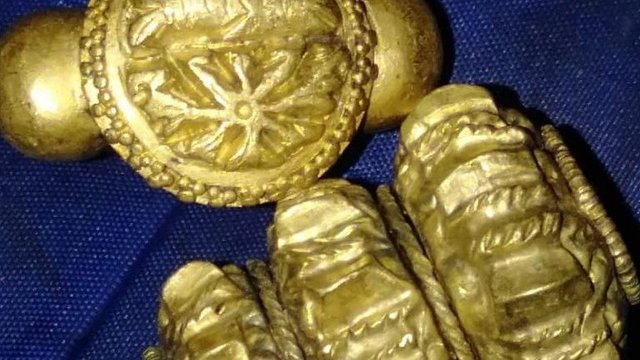Treasures worth millions of the Srivijaya Empire
 )
)
It was a fabled kingdom known in ancient times as the Island of Gold, a civilisation with untold wealth that explorers tried in vain to find long after its unexplained disappearance from history around the 14th century. The site of Srivijaya may finally have been found – by local fishing crews carrying out night-time dives on the Musi River near Palembang on the Indonesian island of Sumatra.
Their extraordinary catches are treasures ranging from a lifesize eighth-century Buddhist statue studded with precious gems – worth millions of pounds – to jewels worthy of kings.

Dr Sean Kingsley, a British maritime archaeologist, said: “In the last five years, extraordinary stuff has been coming up. Coins of all periods, gold and Buddhist statues, gems, all the kinds of things that you might read about in Sinbad the Sailor and think it was made up. It’s actually real.”
He described the trove as definitive evidence that Srivijaya was a “waterworld”, its people living on the river like modern boat people, just as ancient texts record: “When the civilisation ended, their wooden houses, palaces and temples all sank along with all their goods.”
He said: “Bobbing above snapping crocodiles, the local fishers – the modern sea people of Sumatra – have finally unlocked the secret of Srivijaya.”
Research will be published in the latest issue of Wreckwatch magazine, which Kingsley edits. The Srivijayan study forms part of a 180-page autumn publication which focuses on China and the Maritime Silk Road.
Kingsley noted that, at its height, Srivijaya controlled the arteries of the Maritime Silk Road, a colossal market in which local, Chinese and Arab goods were traded: “While the western Mediterranean world was entering the dark ages in the eighth century, one of the world’s greatest kingdoms erupted on to the map of south-east Asia. For over 300 years the rulers of Srivijaya mastered the trade routes between the Middle East and imperial China. Srivijaya became the international crossroads for the finest produce of the age. Its rulers accumulated legendary wealth.”

He writes: “From the shallows have surfaced glittering gold and jewels befitting this richest of kingdoms - everything from tools of trade and weapons of war to relics of religion. From the lost temples and places of worship have appeared bronze and gold Buddhist figurines, bronze temple door-knockers bearing the demonic face of Kala, in Hindu legend the mythical head of Rahu who churned the oceans to make an elixir of immortality. Bronze monks’ bells and gold ceremonial rings are studded with rubies and adorned with four-pronged golden vajra sceptres, the Hindu symbol for the thunderbolt, the deity’s weapon of choice.
“Exquisite gold sword handles would have graced the sides of royal courtesans, while bronze mirrors and hundreds of gold rings, many stamped with enigmatic letters, figures and symbols, earrings and gold necklace beads resurrect the splendour of a merchant aristocracy going about its daily dealings, stamping shipping manifests, in the palace complex.”
Why the kingdom collapsed is unknown. Kingsley speculates that it may have been Asia’s answer to Pompeii, falling victim to Indonesia’s bubbling volcanoes. “Or did the fast-silting, unruly river swallow the city whole?”

Without official excavations, evidence that could answer such questions will be lost. Treasures now retrieved by the fishers are simply being sold before archaeologists can properly study them, ending up with antiquities dealers, while the fishers using dangerous diving equipment and buckets receive a pittance of the true value.
“They are lost to the world,” Kingsley warned. “Vast swathes, including a stunning lifesize Buddhist statue adorned with precious gems, have been lost to the international antiquities market. Newly discovered, the story of the rise and fall of Srivijaya is dying anew without being told.”
As 2022 begins, and you're joining us from Indonesia, there’s a new year resolution we’d like you to consider. Tens of millions have placed their trust in the Guardian’s fearless journalism since we started publishing 200 years ago, turning to us in moments of crisis, uncertainty, solidarity and hope. We’d like to invite you to join more than 1.5 million supporters, from 180 countries, who now power us financially – keeping us open to all, and fiercely independent.
Unlike many others, the Guardian has no shareholders and no billionaire owner. Just the determination and passion to deliver high-impact global reporting, always free from commercial or political influence. Reporting like this is vital for democracy, for fairness and to demand better from the powerful.
And we provide all this for free, for everyone to read. We do this because we believe in information equality. Greater numbers of people can keep track of the global events shaping our world, understand their impact on people and communities, and become inspired to take meaningful action. Millions can benefit from open access to quality, truthful news, regardless of their ability to pay for it.